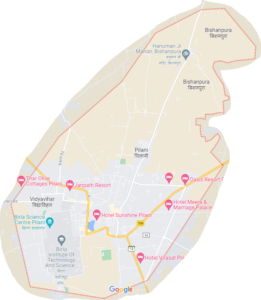Pilani: A Journey through Time

Pilani, a picturesque city nestled in the heart of Rajasthan, India, boasts a rich and diverse history that spans centuries. Known primarily for the prestigious Birla Institute of Technology and Science (BITS), Pilani’s history reflects its transformation from a humble village into a thriving educational and cultural hub. This essay delves into the city’s history, exploring its ancient origins, colonial past, and its emergence as a center of education and innovation.
Ancient Origins:
The history of Pilani dates back to ancient times, intertwined with the Rajput legacy of Rajasthan. While detailed historical records are scarce, Pilani’s location in the Shekhawati region suggests its historical significance. The Shekhawati region, known for its strategic location along trade routes, played a pivotal role in commerce and culture.
During this era, Pilani was likely established as a fortified settlement to protect against invasions and serve as a base for local rulers. The foundations of Pilani’s cultural heritage, including the construction of temples and havelis (traditional Indian mansions), were laid during this period.
Colonial Era:
The British colonial period brought significant changes to Pilani, as it did to the entire Indian subcontinent. Pilani was part of a princely state ruled by the Shekhawati Rajputs during this time. While the region retained its historical and cultural identity, it also witnessed changes in governance and administration under British colonial rule.
British influence led to modernization in Pilani, introducing institutions, infrastructure, and governance practices that laid the groundwork for the city’s transformation.
The Birla Influence:
The pivotal moment in Pilani’s history occurred in the early 20th century with the involvement of the prominent Birla family. The Birlas, a renowned Indian business and industrialist family, played a central role in shaping Pilani’s destiny.
1. Establishment of BITS Pilani: In 1929, BITS Pilani was founded by Seth Shiv Narayan Birla and his grandson, G.D. Birla, with the vision of providing high-quality education in science and technology. The establishment of BITS marked a turning point, transforming Pilani into an educational and intellectual center.
2. Infrastructure Development: The Birla family invested in Pilani’s infrastructure, including roads, transportation networks, and utilities, facilitating the city’s growth and development. Pilani’s transformation into a well-planned city began.
3. Economic Initiatives: The Birla family also contributed to Pilani’s economic development, supporting local businesses and industries, which created employment opportunities and economic prosperity.
Pilani’s growth as an educational and cultural center was closely tied to the rise of BITS Pilani, attracting students and faculty from across India and enriching the city’s diversity.
Growth and Development:
Pilani’s growth continued through the mid-20th century and beyond. Several factors contributed to this evolution:
1. Educational Institutions: Alongside BITS Pilani, several schools and colleges were established, offering education across various disciplines. Pilani’s reputation as an education hub grew.
2. Cultural Significance: Pilani’s cultural significance is evident through its architectural heritage. The city boasts temples, havelis, and traditional Rajasthani buildings that reflect its rich cultural heritage.
3. Industrial Growth: The city witnessed industrial growth, with various industries and businesses setting up operations. Economic diversification contributed to prosperity.
4. Healthcare Facilities: Pilani’s healthcare infrastructure improved, ensuring access to quality medical services.
5. Transportation Networks: Enhanced road and rail connectivity improved Pilani’s accessibility, facilitating further growth.
Cultural Significance:
Pilani’s cultural heritage is rooted in its architectural and artistic treasures:
1. Temples: Pilani houses several temples dedicated to various deities. The Shiv Ganga Temple, dedicated to Lord Shiva, is a revered religious site. The Saraswati Temple, dedicated to the goddess of learning, holds significance for worshippers and visitors alike.
2. Havelis: The city features magnificent havelis adorned with intricate frescoes and exquisite architecture, offering glimpses of the region’s opulent past.
3. Pilani Museum: The Pilani Museum preserves the city’s history and heritage, housing artifacts, documents, and memorabilia related to Pilani’s evolution.
4. Festivals and Celebrations: Pilani celebrates various festivals with enthusiasm, featuring traditional dances, music performances, and cultural events that showcase Rajasthan’s vibrant culture.
5. Traditional Crafts: Pilani is known for traditional crafts, including pottery, textiles, and jewelry, reflecting the skills and artistry of local artisans.
Pilani’s cultural heritage is integral to its identity, and efforts are made to preserve and promote it through its architecture, festivals, and crafts.
Modern Pilani:
Modern Pilani stands as a testament to progress and development, embracing modernity while preserving its historical and cultural heritage:
1. BITS Pilani Campus: The sprawling BITS Pilani campus embodies modernity and academic excellence. State-of-the-art facilities provide an ideal environment for learning and innovation.
2. Education Hub: Pilani retains its status as an education hub, hosting a range of institutions offering courses in diverse fields. It attracts students from across India and around the world.
3. Economic Activities: The city’s economy has diversified, with industries ranging from manufacturing to services. This economic diversification has improved living standards for residents.
4. Healthcare Facilities: Pilani boasts modern healthcare facilities, ensuring residents have access to quality medical care.
5. Connectivity: Pilani’s connectivity has improved significantly, making it accessible by road and rail. This connectivity has facilitated the city’s growth and development.
6. Cultural Exchange: The presence of students and faculty from diverse backgrounds at BITS Pilani has turned the city into a melting pot of cultures, enriching its social fabric.
In conclusion, Pilani’s history is a tale of transformation, from a humble village to a thriving city of education and innovation. Its rich cultural heritage and modern developments coexist harmoniously, making it a city that embraces its past while building a promising future.
